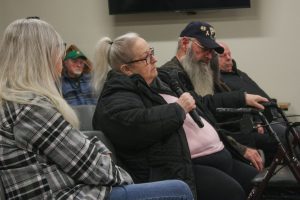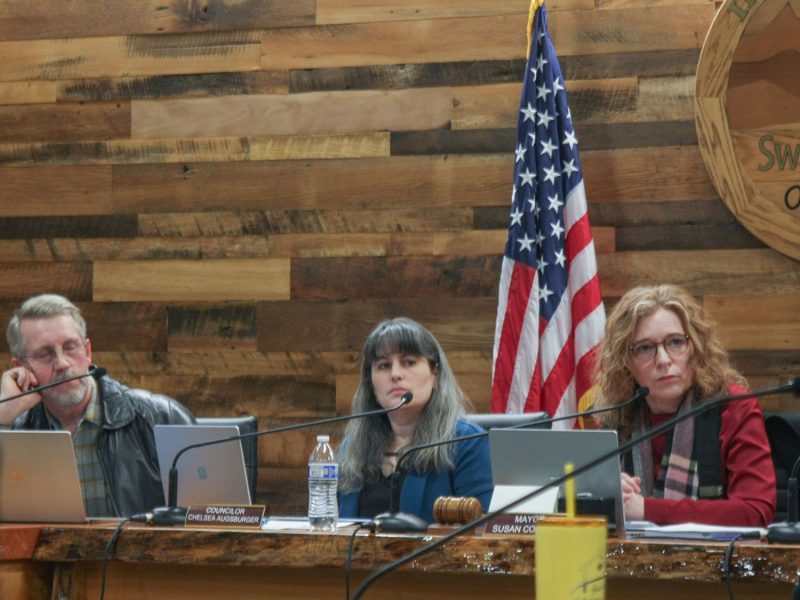This is an updated version of a story previously published on the website. It reflects a work session held on the subject and a change regarding the petition not being ready in time for the May 2025 election.
Supporters who sought to place a May ballot initiative changing the city’s charter regarding mayoral election have filed too late, but City Council is now looking at a direct referral of the same initiative.
The City Council held a work session on Tuesday, Feb. 11, to consider options regarding that proposed charter amendment, specifically concerning a change that would allow voters to select their mayor rather than seven elected council members doing so.
During the work session, Interim City Manager Cecily Pretty informed the council there were three efforts currently underway proposing modifications to the charter. One was the petition, one was a request for a direct referral, and the other was the Charter Review Committee recently opened up by Mayor Susan Coleman.
Pretty explained that, due to timelines established by Linn County, the resident-backed petition would not be completed in time for the May 2025 election. What council discussed during the work session largely revolved around whether the council would essentially place the same or similar ballot title by direct referral.
The ballot title proposed in the resident-backed petition posed the question, “Should the Sweet Home Charter be changed so that the mayor is elected by voters, not by the City Council?”
The Sweet Home Charter, last amended in 2014, is the constitution of the City of Sweet Home. The current charter states that the City Council elects from among itself a chairperson to act as mayor for two years until the next biennial election. According to Pretty, this rule has been in place since at least 1986.
The question of amending the charter so that residents vote for their mayor rather than a council of seven has been posed before, most recently in 2021.
“This question was raised the last time there was a Charter Review Committee back in 2021,” Pretty said. “In addition to the proposal to elect a mayor, there were counter-proposals to require four years of service on council before you can be selected by your peers as mayor, and also to limit a mayor to just two appointed terms. Ultimately, none of these moved forward.”
To watch the last discussion on the topic among Charter Review Committee members on April 27, 2021, visit https://bit.ly/3WTKARb (or search for it on the city’s YouTube page).
Dawn Miller, chief petitioner for this ballot title, said that people have been asking to vote for their mayor for a decade now.
“This is nothing but a quick, simple solution to the people in Sweet Home that had been saying ‘We need to vote for our mayor,’” Miller said. “That’s all it is. It’s a quick, ‘Hey people, do you want to have this power?’”
During a forum of the 12 candidates running for council this past election cycle, every candidate indicated support for a voter-elected system of the city’s mayor. It was candidate Jennifer Victor (who was not able to attend the forum but answered questions during a one-one-one interview) who said a voter-elected system would give residents a chance for their voice to be heard, but also raised questions regarding how effective a different system would be.
“I think the thing that makes me a little bit nervous about that is, with it being opened up, are they going to be voting on the person that truly is going to do the best job, or are they going to be voting on the person that has the most signs out?” Victor asked, adding the idea that ‘he with the most money wins’ might be a problem.
Miller doesn’t see it that way, noting that the same argument could be made for candidates running for a city council seat.
“What I am doing with that petition is merely giving the people their voice,” Miller said. “Do you want to vote for your mayor, or don’t you?”
During the work session, Councilor Aaron Hegge said he supported a voted-in mayor system at the forum because that’s his personal opinion, but he recognizes that, as a councilor, he is representing his constituents. Hegge said that since becoming a councilor, he has heard from many of his constituents that they want to keep the system the way it currently is.
Councilor Chelsea Augsburger pointed out that, by putting this question on the ballot, that gives the people the chance to have their voice; they will either vote it down or pass it through.
“I feel like the seven of us up here deciding whether or not that people should have a chance to vote on this, we should let the people answer for how they feel,” Augsburger said.
Councilor Ken Bronson said he didn’t have a problem letting the people vote on the matter, but he wasn’t comfortable with how quickly he believes this is coming forth. There are four election cycles between now and the end of the current mayor’s term, so it seems logical to him, he said, that taking more time to research and come up with a procedure by consensus made more sense than “cramming this thing through in a very short time frame for the May election.” Bronson later added that having more time before it reaches the ballot would provide time for the community to “really get involved in the process.”
Councilor Angelita Sanchez said other nearby communities already have the procedure in place, so she doesn’t perceive this proposal as anything that is rushed.

Miller told council during its regular meeting (following the work session that evening) that this has not been rushed, adding that the topic was discussed at the most recent charter review committee meeting, during which no one came to any consensus either way.
“This is something that’s been talked about many times,” she said. “I understand some of the new councilors feel this is being rushed, but this is something that we have asked for for years…All I am asking is for you guys to see the people want a chance to have their voices heard. What better way than in the ballot box?”
Resident David Lowman reiterated Miller’s sentiment.
“It’s not being rushed because if we put it on the ballot for May, you’ve got a year and a half,” he said. “That’s plenty of time to air out what the mayor needs to do.”
Sweet Home has a “weak” mayor system, meaning that the mayor has extremely limited administrative authority and largely serves as a figurehead, Pretty explained. The mayor is the chairperson at City Council meetings, and works alongside the city manager to set agendas. He/she may also make direct appointments to boards and committees.
Voting “yes” for the charter change as proposed by the petition would allow residents to vote for who would be their mayor. The ballot title clarifies that the current mayor and councilors would continue to serve out the rest of their terms. Terms for councilors Augsburger, Dylan Richards and Joshua Thorstad, and Mayor Susan Coleman end January 2027, and terms for councilors Bronson, Hegge and Sanchez end January 2029. If the measure passes, voters will vote for their next mayor in the 2026 general election for a term to begin in 2027.
Another question raised during the work session revolved around the cost to put this question on the ballot. If it goes on the May or November ballot this year, the City of Sweet Home has to pay into the thousands for all ballot titles in that election – which in May will include levy renewals for the Sweet Home Police Department and the Sweet Home Public Library.
The cost is yet not known due to a number of factors that play into the calculations. If it goes on the ballot in May 2026, then Linn County has to pay the costs.
Councilors also raised the question of how many voters would turn out for an election this year versus next.
Bronson ultimately decided he wanted the ballot title in the May 2026 election, and Hegge said he’d prefer it to go through the Charter Review Committee process.
Councilors Augsburger, Richards and Sanchez indicated they’d like to put the direct referral on the May 2025 ballot, while Thorstad said he’d like to move forward in that direction as well just so that it is placed on the next upcoming City Council meeting where the public would have opportunity to speak on the matter.
“I don’t really want to rush this through – I just feel rushed,” Thorstad said. “But I also want to do what the people say, so I’m willing to hear what they have to say.”
With the latter four forming a consensus, the next council meeting on Feb. 25 will include an agenda item for a resolution placing a direct referral on the May 2025 ballot. Residents will have opportunity during public comment time to voice their opinion on the matter before the council votes whether to accept the resolution, reject the resolution, or accept the resolution with modifications.
In theory, Miller could still go out gathering signatures for her petition to have it placed on the November 2025 (or later) ballot. She would have to gather at least 1,153 signatures (15% of registered voters). Miller is confident she can reach the mark.
“What we have heard from over 2,000 people is they want to vote their mayor in,” she said.





